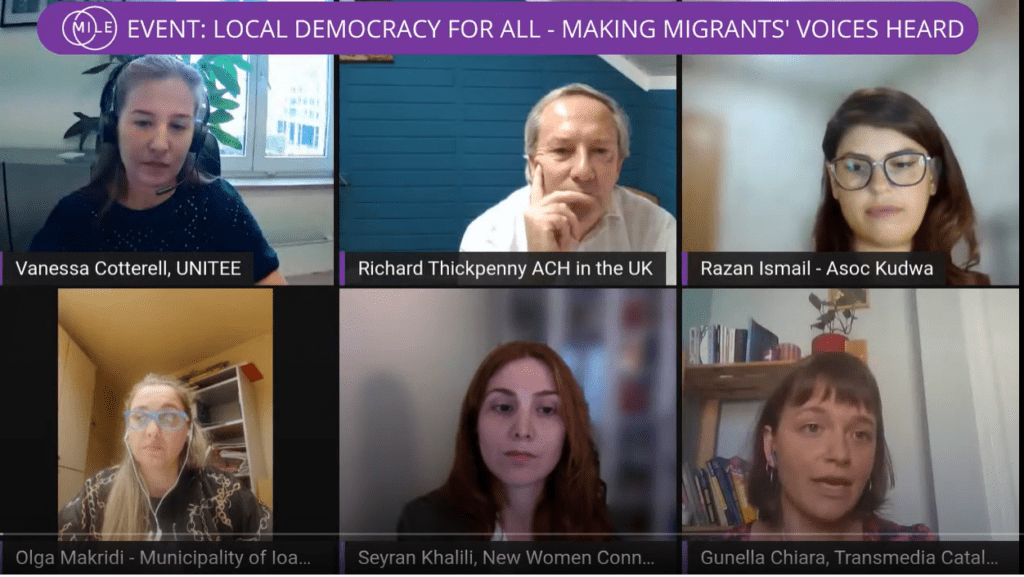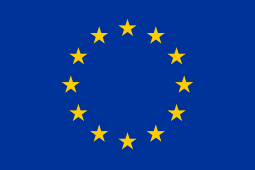On the occasion of International Day of Democracy on 15 September 2022, MILE held an online event to exchange ideas on local democracy and discuss different ways to enhance the representation and participation of migrants and refugees in local decisions and policies.
The MILE partners that took part in the discussion – Vanessa Cotterell (UNITEE), Chiara Gunella (Transmedia Catalonia – UAB), Razan Ismail (Asociación Kudwa), Richard Thickpenny (ACH), Seyran Khalili (New Women Connectors) and Olga Makridi (Municipality of Ioannina) – shared their experience with different participation and inclusion tools and exchanged thoughts on how different actors, including their respective organisations, can contribute to more inclusive local communities. The mayor of Ioannina, Moses Elisaf, shared his thoughts on the importance of civic participation for local democracy through a recorded message.
What do we actually mean when we talk about inclusive cities?
While the partners involved in MILE all have varying standpoints and represent different groups and causes, they agreed that an inclusive city should be, above all, a space where everyone can express their opinion and ideas regardless of their background and experience. Moreover, they highlighted the benefits of diverse and multicultural teams working together on projects around migration, participation and inclusion.
Different backgrounds mean different perspectives on activism and democracy. To reach a diverse populations and to be able to respond to the needs of different groups, it is important that policy- and decision-makers are sensitised towards the individual and unique experiences of a city’s residents, especially of under-represented groups such as migrants and refugees. To this end, an intersectional and intercultural lens can also help understand certain dynamics of exclusion and promote more inclusive policies.
Language and communication is key. It is equally important to be aware of how we communicate with one another and realise the impact language can have on participation and mobilisation. For instance, the meaning and also the priority of democracy, activism and participation in someone’s life can depend very much on their experience and current situation. For instance, someone struggling to survive, find a place to sleep or to pay the bills may not be able to give high priority to participating in local decision-making activities. Instead of wanting to have a say on green spaces in the city, it will maybe be more urgent them to have support with securing a job, education, health care, childcare and affordable housing.
Another challenging step in making cities and local decision-making more inclusive is to find right channel or mode to connect local governments and citizens in a meaningful and sustainable way. Here we need to take into account for instance language, the access to information, the knowledge of the local system and rules around decision-making processes, and the personal capacity of migrants to be able to take part in decision-making processes. In this context, a challenge can be the lack of recognition or remuneration for minorities participating on a voluntary basis in decision-making bodies.
While the discussion produced a plethora of ideas on how to enhance local democracy, it was highlighted that the participation and inclusion of migrants and other minority groups require an effort from all involved actors. Policy-makers and local actors working on inclusion and representation need to understand and empathise migrants’ perspectives, opinions and beliefs first to build a real connection and to involve them in a meaningful way. Moreover, participation among minority groups can be encouraged by creating safe spaces where they can express their ideas freely and where their needs and priorities will be understood and taken seriously. Trusted mediators, collectives but also civil society organisations and networks can act as role models, community leaders and facilitators of participation, by listening to migrants’ needs, providing them with tools for advocacy and collaboration and by connecting them with decision-making bodies and public authorities, such as municipalities.
Rewatch the event:


